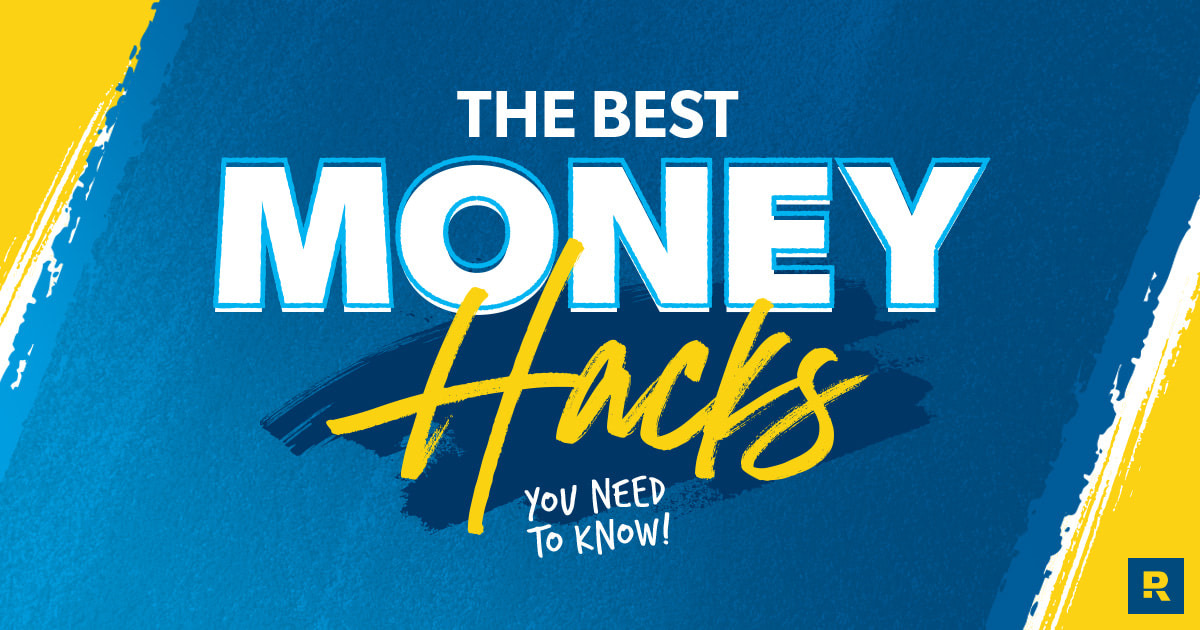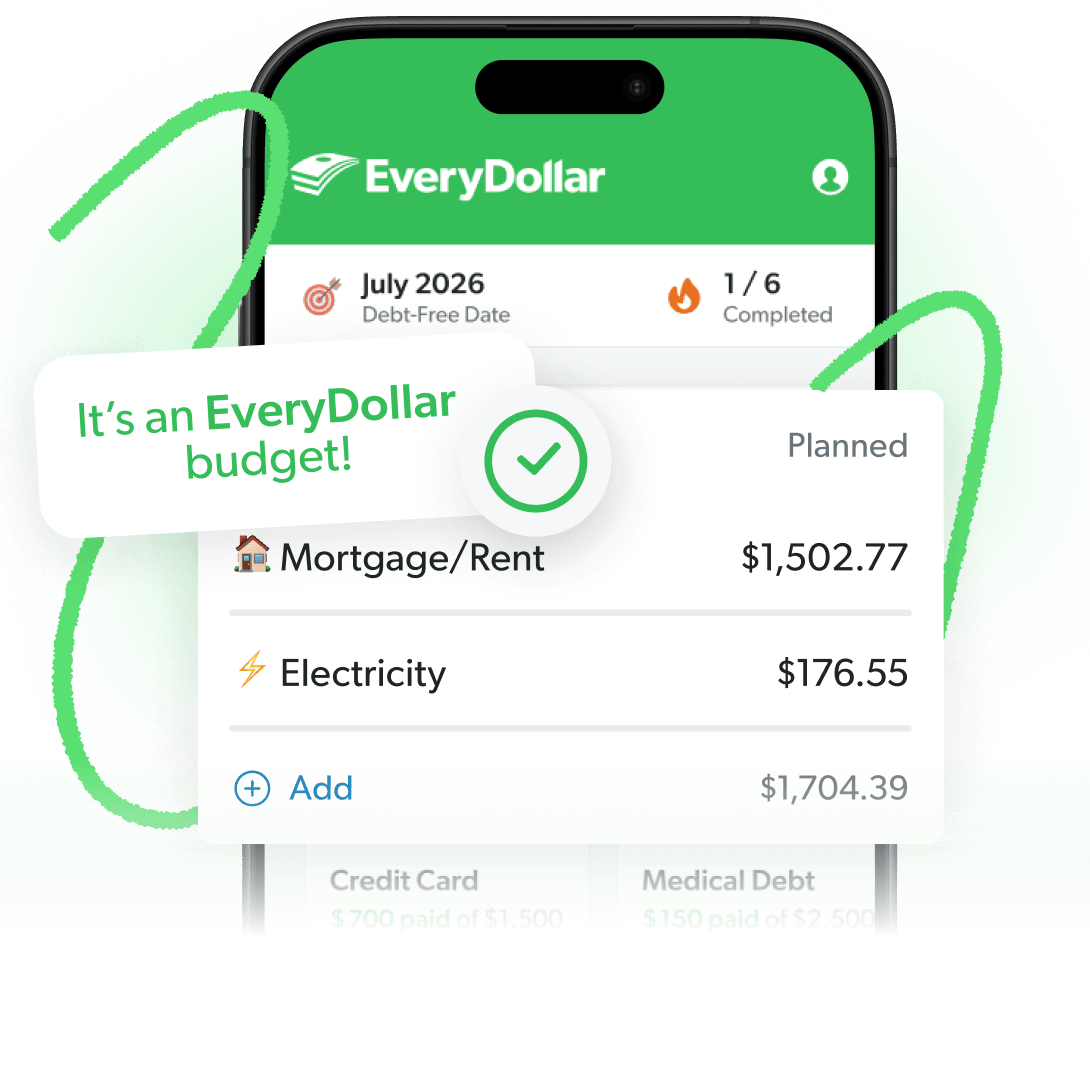Key Takeaways
- Making a budget every month—planning ahead, writing down every transaction, and resisting impulse buys—is the most important hack you can do to win with money.
- Review your insurance policies once a year to save some money (you might be overpaying!).
- Creating more margin in your budget (the breathing room between your income and expenses) is key to getting ahead with your money goals.
If getting better with money is on your to-do list, then first of all, I applaud you! (You couldn’t hear it, but I paused my typing to clap.)
Seriously, this one change can spread to all other areas of your life quicker than a rumor in a small town. Get your money act together and you’ll start feeling less stress and more confidence all over the place. And it’s not even wishful thinking. With these six money hacks, you can start winning with money. (And by hacks, I mean tips that will take some work. But hey, at least I did the legwork for you!)
1. Make a monthly budget (every month).
I can’t start my money hacks list with anything else. You need to budget every month (and I mean every single month). Don’t click away just yet—this isn’t about being a cheapskate or cutting all the fun out of your life.
A budget is simply a plan for your money—for everything coming in and everything going out. It’s you giving every dollar a job. You know: paying bills, stocking the fridge (yes, actually buying groceries instead of eating out every night), paying for that flight to NYC, and saving for that luxury two-story doghouse for your Frenchies. Is that last one just me? Probably.
Making a plan for your money (aka budgeting) is how you go from wondering where your money went to telling it where to go! It puts you in the driver’s seat, calling the shots, and all the other metaphors about being in control of your finances.
When you don’t know where to begin, begin with a budget!
The Budgeting App That Finds Hidden Margin
You’ve got more margin than you think. EveryDollar helps you find it in minutes so you can start making real money progress, really fast.
2. Track your transactions (every one).
I’ve got good news and bad news. The bad news is, your budget isn’t a slow cooker. You can’t just throw in meat, veggies and sauce and walk away until dinnertime. (Or in this case, until next month.)
The good news is, the way you stay on top of the budget isn’t hard. It’s just habit. And that habit is tracking your transactions. Every one.
Here’s what I mean by that. Every time you spend or make money during the month—track it.
When you get a paycheck from your day job (or your side gig), you track it into your budget’s income category. When you gas up the Honda, that expense gets tracked and deducted from your transportation category. When you stop by ALDI for all those fancy cheeses and cured meats for a romantic charcuterie night, you track that expense into your date night budget line.
Those are just examples, but the point here is this: Tracking your transactions is how you stick to the budget you created. It’s how you keep an eye on your spending so you don’t end up overspending. It’s the best way to stay accountable—for your money goals, to your spouse (if you’re married), and to yourself!
3. Budget for your goals.
Speaking of money goals, the best way to reach them is by . . . drumroll, please . . . budgeting! If you want to pay off debt, you’ve got to adjust your budget to meet that goal. If you want to finally make that trip to Philly, you’ve got to make room in the budget to save up for it. Because recreating the Rocky training montage up those 72 steps of the Philadelphia Museum of Art while your wife films in embarrassment is a worthy dream, my friends.
And don’t stop there! The truth is, you need to get your budget ready for any and all life goals. Getting fit might mean spending more money on protein powder, quality meats and kettlebells for your home gym. Getting promoted might mean buying a few blazers to replace your single-use H&M cardigans. Checking everything off your reading list might mean a subscription to Audible. (Though, I want to shout out apps like Libby where you can connect to your local library and check out audiobooks and e-books for free!)
Don’t go crazy here. Make sure you’re only purchasing things that 1) you can afford and 2) you’ll actually use. And make sure you’re budgeting ahead for those purchases!
4. Check in on all your insurances.
What’s insurance doing on a money hacks list? Well, you do pay for it . . . Maybe you had a major home repair you thought was covered. But surprise! It wasn’t. Or maybe you’re still holding on to that overpriced policy you signed up for five years ago. The truth is, having the wrong coverage (or not having enough coverage) can cost you big time when life happens.
Okay, but how the heck do you know if you’ve got the right coverage for your life? Trust me, I know the mystical world of insurance can feel harder to navigate than the plot of Inception. But you don’t have to figure it all out alone.
Take the Coverage Checkup to get a personalized insurance action plan that breaks down what to keep, add or nix so you can take control of your finances with confidence.
5. Cut back on impulse purchases.
If you read that and said out loud to yourself, “Oh, nice. Sure. I know I should. But how, George? How?”—well, don’t you worry. I’ve got some practical ways you can cut back on impulse purchases. But first, let me set the stage for why this is such a valuable money hack.
The average American spends $151 a month (aka $1,812 a year) on impulse buys alone!1 What else could you be doing with that money? Literally anything else productive. Instead, you’re sitting on a pile of used candy bar wrappers from the checkout line, half-burned holiday-scented candles you just had to have, and that influencer-peddled lipstick you thought was going to change your life.
Okay. So that’s the why. Here’s the how.
Delete shopping apps from your phone.
Don’t come at me. Almost half of Americans do most of their shopping on their phones.2 Remove the temptation that’s right in your pocket, purse or hand at any second. Delete those apps and do any necessary online shopping from your laptop or desktop.
Think before you buy.
Instead of that instant, one-click-purchase lifestyle, give yourself time before you buy. Think things through. Here are the five questions you should ask yourself before making a purchase:
- Will this add value to my life?
- Am I buying this for the right reason?
- Is this in my budget?
- Is this the best option, retailer and price?
- Is now the time to buy it?
If you can’t answer yes to all of those questions, that means you need to say no to whatever you’re thinking of buying.
Create a budget line for personal spending.
One way to keep the impulse spending at bay is to make room in the budget for personal spending (aka fun money). Then if you want that candy bar or holiday-scented candle, you can buy it—if you’re willing to use your personal spending money on it.
The more you track those impulse purchases to your own spending line, the more you’ll realize how much they’re really costing you. You’ll either say it’s worth it to feed your Starbucks fix . . . or not. Either way, you’re being accountable for your spending on that grande no-whip half-caf white chocolate mocha with five pumps and an extra shot. (Side note: What kind of monster gets a drink with half the caffeine but then adds an espresso shot? Bold move.)
6. Get more margin in your budget.
If you want to have more money in the budget (to make up for inflation jacking up the costs of everything—or because you’ve got those goals to hit), you need more margin.
What does that mean? Well, think about the margin on a piece of paper. You know, that space on the edges where your teacher wrote rude comments on your test, like, “George, the song lyrics to this Blink-182 song are not an acceptable answer to this short essay about the quadratic formula.” The key word here is space. More margin means more space and—in this case—more breathing room in your bank account.
How can you have more breathing room? Lots of ways! It mostly boils down to these two things though:
Increase your income. (Make more!)
Start a side hustle, apply for a higher paying job, sell some stuff, freelance, or bust it at work and get that raise! Just remember, when you increase your income, put that extra money in the budget or it won’t be extra margin. It’ll be spent accidentally.
Need some inspiration on side hustles that could be a good fit? Take my free side hustle quiz to get a personalized list of side hustles that make sense for your schedule and lifestyle.
Decrease your expenses. (Spend less!)
Meal plan so you spend less on food. Hitchhike—okay, carpool—so you save on gas. (And hey, that’s an eco-friendly win too.) Get a roommate to cut your rent in half. Take shorter (not fewer, please) showers so your utility bill doesn’t skyrocket. Bottom line? Find ways to lower your spending and cut extra expenses for a surefire way to get margin in your budget!
Money Hacks Are Worth It
Yes, everything I listed takes a little time and intention. But listen: It’s. Worth. It. Putting this checklist into action will help you manage your money better and get you on a path to an amazing money future.
Next Steps
1. Read the first chapter of my book, Breaking Free From Broke, for free. I’ve packed even more money hacks into the book and a ton of tips to overcome all the money traps out there in our crazy world.
2. Download the EveryDollar app. EveryDollar does more than just help you track your spending and manage your money—it actually helps you find more margin every month!




